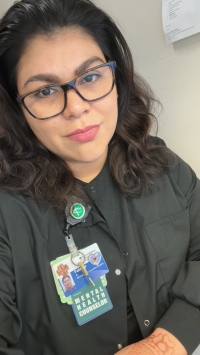
Fatima Al-kinani left the military in her mid-20s. After a decade spent raising her children, she decided it was time to go back to school. Taking advantage of the GI Bill, she eventually earned her bachelor’s degree in social work from the University of Washington Tacoma.
But as soon as she finished her undergraduate degree in 2019, Fatima knew she wanted more out of her career. So, even though she was already working in the field as a crisis counselor at Providence Health & Services, she decided to enroll in the MSW Extended Degree Program at the UW in Seattle.
“At first I was hesitant, because the GI Bill doesn’t pay for graduate school,” she says. “But I wanted to get in a better place financially. Getting my master’s has meant a new role and a big jump in pay; it’s made a huge difference for me and my family.”
In this interview, the MSW graduate discusses how the program gave her the knowledge and confidence to become a budding leader in the field.
Why did you become a social worker?
It felt like a calling. In the army, I was always volunteering for things that were like social work, such as helping my friends get benefits. Plus, coming from so many different kinds of backgrounds — I’m an immigrant, a Spanish speaker, a Muslim, a single mom — I felt like there was a need for more diverse social workers.
How did the program curriculum specifically help you in your career?
It was designed around my career goals; I wanted to work in behavioral health. So, all my electives were centered around that concentration.
I took a course in pharmacology. I studied substance abuse disorder. I also took a couple of geriatric classes because of the influx of geriatric patients with behavioral health needs.
How were you able to manage studying in the MSW Extended Degree Program with the counseling job you had at Providence?
Graduate school is very challenging. I was a single mom with three kids, and I was working full time. It was a lot of careful time management.
I loved that the classes were mostly on the weekends. I was able to juggle things, to figure out my schedule and manage my time while handling the demands of the program. It was very challenging, but not impossible.
What did the faculty bring to the Extended Degree Program?
Many of the professors are practicing social workers, and I think that’s so incredibly helpful. Many of them are either in private practice or working as mental health clinicians.
What was your practicum experience like?
I did my main practicum at Western State Hospital. A professor in the MSW program helped me set that up. I’m an emergency room crisis counselor, so I wanted to step up to the next level. And for me, that meant Western State. Every patient there has committed a crime, but because of a mental health condition they are not able to do time in prison. It was a lot of case management — getting patients connected with services, coordinating with their families, handling their court dates. It was a great experience.
Do you feel like the program sets you up for future career success?
Yes. I feel like I'm a very well-rounded social worker because of the classes that I had to take. It’s such an excellent program that I feel very confident. Shortly after obtaining my master's degree, I experienced a swift promotion at Providence. I believe the outstanding reputation of the UW program played a pivotal role in this advancement.
I’ve been given all the skills that I need to get to the next level, such as within my hospital’s management. I think I have what it takes.
How have you seen the field evolve since you first became a social worker?
I think it’s really changed in the last 5 to 10 years. Before, when I’d tell people I was going to be a social worker, they’d say, “Oh, you poor thing — you're not going to make any money.” But it’s starting to become a career where you can get paid pretty well and make a comfortable living. And people now say to me, “Oh, there’s such high demand for social workers.” Especially for educated clinicians and counselors, there’s lots of places hiring.